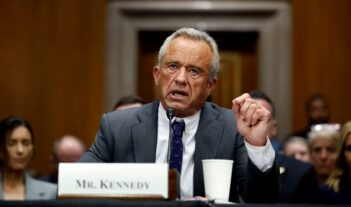
Scholars say constitutionally shaky infectious disease regulations must yield to better prevention programs.
In response to the spread of Ebola and Middle Eastern Respiratory Syndrome across the United States, federal health agencies issued regulations in 2017 that authorize U.S. officials to isolate people exposed to an infectious disease.
But in a recent paper, scholars argue that these so-called quarantine regulations raise serious constitutional problems because they open the door to “particularly extreme deprivations of liberty,” such as the arbitrary and indefinite confinement of people in government facilities.
Given the risk of constitutional violations posed by the quarantine regulations, the federal government should only exert its quarantine powers in cases where disease transmission risks are high and life-threatening, argue Boston University’s Michael R. Ulrich and Wendy K. Mariner. Instead, they say the federal government should implement initiatives that empower Americans to make preventive health decisions on their own, without fear of coercive government action.
One constitutional problem raised by the quarantine regulations relates to the ease with which the U.S. Department of Health and Human Services (HHS) and the Centers for Disease Control and Prevention (CDC)—the agencies charged with the regulations’ enforcement—could place Americans under involuntary quarantine, write Ulrich and Mariner.
According to Ulrich and Mariner, the regulations only require U.S. officials to have a reasonable belief that a person has an infectious disease. But the federal government should not possess such enforcement discretion when quarantining Americans against their will, declare Ulrich and Mariner.
To support their position, Ulrich and Mariner point to a U.S. Supreme Court decision that defines the standards under which government officials can involuntarily commit people with mental illnesses to health care facilities. These standards serve as guideposts for determining when the federal government can involuntarily quarantine Americans.
In a case called Foucha v. Louisiana, the Supreme Court explained that involuntary commitment does not violate the constitutional rights of people with mental illnesses when there is sufficient evidence to conclude that they have a mental illness and present a danger to themselves or others.
Ulrich and Mariner claim that the government should have to make a similar showing before quarantining U.S. citizens against their will. Government officials should have to prove that the person has an infectious disease, and that the person presents a risk of harm to other people.
But Ulrich and Mariner contend that the lenient standards established by the recent quarantine regulations give U.S. officials much more discretion than allowed under Foucha. Without requiring U.S. officials to find that a person both has an infectious disease and presents health risks to others, the quarantine regulations lend themselves to overly broad enforcement, exposing quarantined people to potential constitutional violations.
Ulrich and Mariner also conclude that the regulations offer insufficient mechanisms for people to leave quarantine if they do not belong there in the first place. Without such mechanisms, quarantined people face risks of indefinite confinement, which would pose further constitutional problems.
Once U.S. officials place a person under quarantine, the regulations require HHS and the CDC to appoint a medical expert charged with examining whether the person has an infectious disease.
Yet, under the regulations, the allegedly infected person may wait for an indefinite period of time before interacting with a medical professional, claim Ulrich and Mariner. Assuming HHS and the CDC do complete the prescribed medical review, the agencies have no deadline by which they must decide whether to keep people quarantined or release them back into the community.
According to Ulrich and Mariner, the regulations fail to meet constitutional due process standards.
These constitutional standards would require the federal government to substantiate decisions to quarantine people involuntarily by making “prompt” and “periodic” assessments of the infectious disease risks they pose, maintain Ulrich and Mariner. But, by bypassing these standards, the regulations leave room for the unjustified—and unconstitutional—quarantining of Americans.
Given the constitutional risks posed by the quarantine regulations, Ulrich and Mariner advocate for initiatives that encourage people to seek expert medical advice if they suspect they have an infectious disease and to use that advice to make their own informed decisions. Such initiatives would also limit involuntary quarantine measures to emergency situations where the risks of constitutional violations do not exist.
When doctors do make infectious disease diagnoses, these initiatives would in turn ensure that employers—through government compensation programs—neither fire nor withhold wages from infected people because of their diseases, add Ulrich and Mariner. One example of such an initiative is Singapore’s Home Quarantine Allowance Scheme, which provided financial and employment assistance to Singaporeans affected by the severe acute respiratory syndrome outbreak in 2003.
Owing to these initiatives, people with infectious diseases will feel freer to undergo medical treatment for a prescribed period of time without risking their job security, say Ulrich and Mariner.
Because evidence suggests that financial concerns often lead Americans to avoid cooperating with public health recommendations, compensation programs become key to effective infectious disease prevention, explain Ulrich and Mariner. Such programs empower Americans to make evidence-based health decisions, while freeing them from the threat of quarantine.



